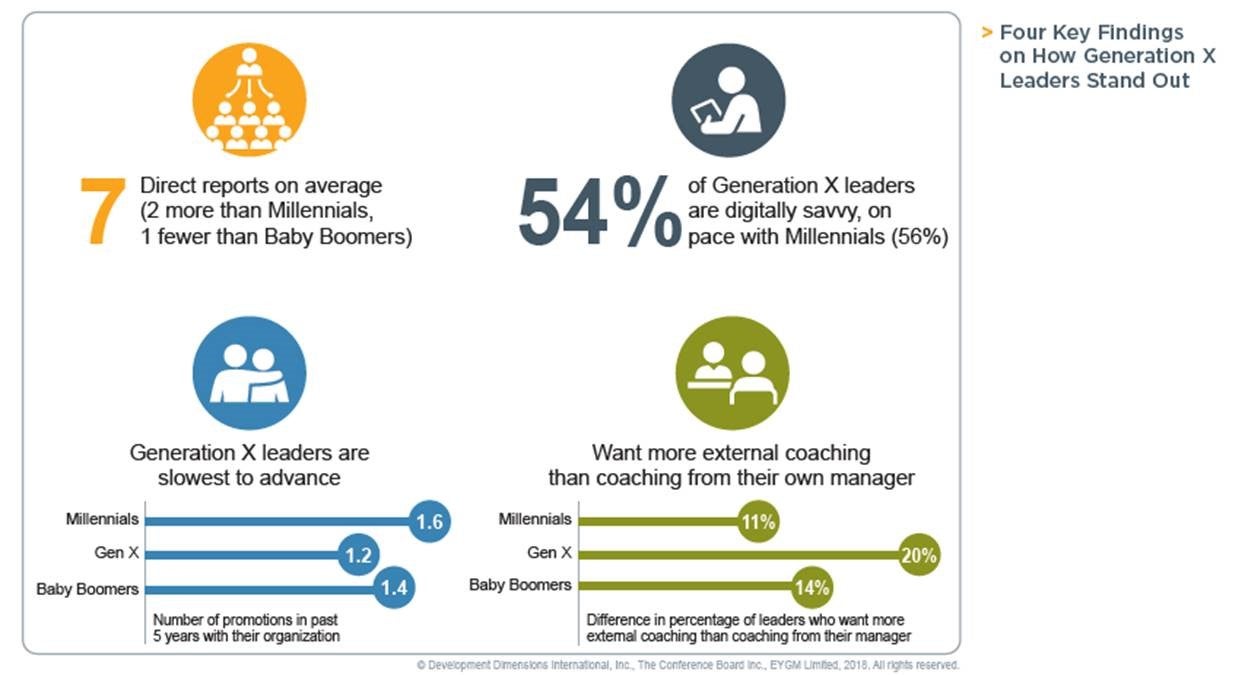by Stephanie Neal and Rich Wellins, Ph.D.
What do Elon Musk of Tesla, Sara Blakely of Spanx, Jack Dorsey of Twitter, and Sergei Brin of Google have in common? Yes, they all founded and lead companies that have transformed the business world, but they’re also all members of Generation X, born between 1965 and 1981.
It’s not too often that we hear about this generation. Most media coverage and discussion of generational trends in the workplace has focused on the two larger generations surrounding Gen X—the gradually retiring Boomers and the ascending Millennials, now the world’s majority generation. By next year, it’s forecasted that Millennials in the workplace will increase to over 56 million in the United States alone. Yet, the reality is that this is only 5 percent more than the expected number of Gen Xers, who though they may be overlooked, are leading the way in a time of great change. Gen Xers now account for the majority of all leadership roles globally (51 percent). On average, they have 20 years of workplace experience, and are primed to assume all top executive roles. Yet little is known about what distinguishes this generation in the workplace.
With this in mind we took a closer look at Gen X leaders and how they differ from other generations as part of our eighth Global Leadership Forecast study. This year’s study involved over 25,000 leaders spanning 54 countries and 26 major industry sectors. Sixty-one percent of leaders involved in the study were, in fact, Gen Xers. Their responses, along with those from their younger and older colleagues, revealed that there are four key ways this generation of leaders stand out (depicted in the graphic below):
Digital connectors and collaborators
Although they aren’t thought of as digital natives to the extent that Millennials are, we found that Gen X leaders are equally confident in their digital leadership capability, and they’re stronger in many conventional leadership skills including driving execution, collaboration and building talent. According to Nielsen research, they’re also the most connected generation. Gen Xers use social media 40 minutes more frequently each week than Millennials, translating to about 17 percent more time spent on Facebook or Instagram. They are also more likely to stay on their phones at meals and spend more time on every type of device—phone, computer, or tablet. And as it turns out, Gen X is bringing this connectivity to work. More than any other generation of leaders, they are driving business transformation by making connections between ideas and diverse perspectives across their organizations and pushing forward with big-picture thinking.

Fast-growing influence and responsibility
While Gen X leaders are often under-recognized for the critical role they play in leadership, they are also assuming a heavier workload. On average, Gen X leaders manage seven direct reports, compared to Millennials, who have only five direct reports. As they ascend into more and higher-level leadership roles, Gen Xers continue to extend their influence within their organizations. It also isn’t uncommon for Gen Xers to demonstrate greater influence through ventures of their own. According to Sage’s State of the Startup report, Gen Xers comprise the highest percentage of startup founders (55 percent), making this generation more likely than any other to start a business. Sage reports that it is Gen Xers who “overwhelmingly dominate the playing field” when it comes to starting new businesses.
Slower to advance, but fiercely loyal
Despite growing influence and increased responsibility at work, we found that Gen Xers are the most overlooked for promotion and have been slowest to advance. On average, Gen X leaders received only 1.2 promotions within the past 5 years, significantly lower than their younger Millennial counterparts (1.6 promotions) and baby Boomers (1.4 promotions) during the same period. While their advancement rate has been slower and their teams have grown larger, Gen X remain loyal employees. Only 37 percent contemplate leaving to advance their careers, five percentage points lower than Millennials.
Seeking outside perspective and development
Although most Gen X leaders aren’t looking outside for a new job, they are seeking more external development and coaching than any other generation. In fact, leaders from this generational cohort are much more likely than either Millennial or Baby Boomer leaders to prefer external coaching over internal coaching. Most notably, 67 percent of Gen X leaders said they would like more external coaching, compared to only 47 percent who said they want more coaching from their managers—a 20 percent difference.
Gen Xers also reported that they want more externally developed (57 percent) than internally developed (46 percent) material to support their leadership development, whereas an equal number of Millennials and Baby Boomers reported wanting more of both types of material. This is a strong indication that not only do Gen Xers see new opportunity in outside learning, but also that organizations that can successfully employ more external learning may be able to extend their capabilities into new areas and lines of business with this next generation of leaders.
These findings reveal that in many ways, Gen X leaders are bridging the gap between the two larger generations surrounding them in the workplace. Demonstrating employer-loyalty, a willingness to take on a heavier workload, and a strong combination of digital and traditional leadership skills, this generation is producing powerful leaders that are in danger of being overlooked. Organizations that want to retain and further develop their Gen X leaders should:
- Provide leaders with more external guidance. While Gen X leaders are loyal, they crave insight and knowledge from mentors outside of their organization. In addition to providing external coaches, employers should invest in providing Gen X leaders with opportunities to participate in outside professional organizations, industry conferences, and other groups to foster relationships with external peers and mentors who can provide additional coaching.
- Encourage leaders to challenge the status quo. Many organizations may look to Millennials to lead innovative, new projects, particularly in the technology sector. But Gen X leaders are likely to thrive when given the opportunity to experiment with new approaches and challenge existing methods. Organizations should tap Gen Xers to lead cross-generational, diverse teams to deliver the most innovative solutions.
- Leverage technology to support traditional development. Like all leaders in other generations, Gen X leaders said they most want traditional learning methods, such as formal workshops, training courses and seminars. However, they are also seeking the personalization and convenience offered by technology-based tools. To help Gen X leaders make the most of their development opportunities, the ideal solution will blend traditional learning methods with tech-enabled tools to enhance and solidify learning.
Gen X employees will continue leading the workforce for 15-20 more years, and the youngest members of the generation may still be working for another 30. This means that this generation will be the backbone of organizations’ leadership for quite some time. Organizations that overlook them in favor of focusing on the younger generations entering the workforce will miss out on a deep and valuable source of leadership potential. Instead, this is the time to focus on strengthening the skills of Gen X and further developing their broad range of skills to propel future growth for everyone.
Learn more about Gen X leaders in DDI's Global Leadership Forecast 2018.
Stephanie Neal is a research consultant for the Center for Analytics and Behavioral Research (CABER). She conducts evaluation studies and research on leadership and talent in the workplace, and is a co-author of DDI's Global Leadership Forecast.
Rich Wellins, Ph.D. is a senior research associate for DDI and a co-author of the Global Leadership Forecast 2018.
Topics covered in this blog

